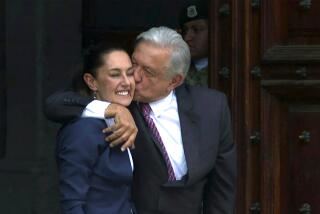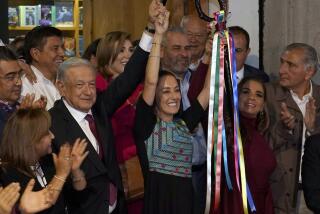Extent of Change in Mexico’s PRI Unclear : Reforms: Convention that revised structure of the ruling party ends on a note of unity. Earlier, some delegates had demanded a greater voice.
- Share via
MEXICO CITY — Chanting and waving banners, more than 9,000 delegates closed the three-day national convention of Mexico’s ruling party Monday in a display of unity that belied the schisms obvious in meetings over the weekend.
In sometimes heated debate, delegates approved changes to the party structure, creating, for instance, a national political council, an elected committee with the goal of balancing a traditional party hierarchy based on national interest groups with more regional representation.
What remained unclear was how much the convention had changed the Institutional Revolutionary Party--known as the PRI, after its Spanish initials--which has ruled Mexico for 61 years.
“This is the historic moment for our party to get back on the track to democracy and social justice,” declared Raul Manriquez, a delegate from the mining and farming state of San Luis Potosi, where opposition candidates are expected to mount a strong campaign in the governor’s race this autumn.
But did the PRI miss the moment?
“This was supposed to be the big convention for change in the PRI, and it began like the most traditional of PRI meetings,” complained Lorenzo Meyer, a political scientist at El Colegio de Mexico, a university here.
On Saturday, the party executive committee president and general secretary were reelected, unopposed, by voice vote during a carefully stage-managed opening ceremony.
“The basis of an election is that there are at least two candidates (per office),” said Meyer. “If there is not competition, it’s not an election.”
However, surprises did occur late Saturday and Sunday, when the convention broke into dozens of workshops to hammer out changes on specific party rules and positions. Delegates demanded the greater voice that their leaders had promised.
From selection of committee chairmen to preparation of reports, delegates fought to wrest control from the workshop leaders appointed by the PRI executive committee.
A group of party members from a Mexico City ward called Colonia Liberales 1857 even arrived at the meeting place of one workshop in an attempt to unseat a delegate they said was not fairly elected to represent them.
“The party is not bad,” said Rosa Maria Hernandez Duran, one of the protesters. “However, there are representatives that are using the party for personal benefit.”
Beyond the occasional outbursts, Meyer said, the convention proceeded much as party leaders had planned.
For example, a measure that will allow citizens to join the party as individuals will force labor unions and farm groups to share power more. Previously, the only way to be affiliated was to belong to an organization that was part of the party.
However, unions actually lost much of their power within the party two years ago when large numbers of union-sponsored candidates were defeated in congressional elections, Meyer said; the change in the formal structure simply reflects changes that have already occurred.
The real test of the party’s will to be more democratic will come in the state and local elections in Mexico state this fall, he said. The PRI lost heavily in that urban state surrounding Mexico City two years ago. Now, the party must try to win without fraud in the coming elections.
The strongest blow to the PRI image may have occurred even before the convention opened. As party officials boasted about their democratic reforms, the respected Peruvian novelist Mario Vargas Llosa, on a visit to Mexico, called the country “the perfect dictatorship . . . not of a man, but of a party.”
When asked to comment, President Carlos Salinas de Gortari would say only that Vargas Llosa is “a good novelist.”
More to Read
Sign up for Essential California
The most important California stories and recommendations in your inbox every morning.
You may occasionally receive promotional content from the Los Angeles Times.













